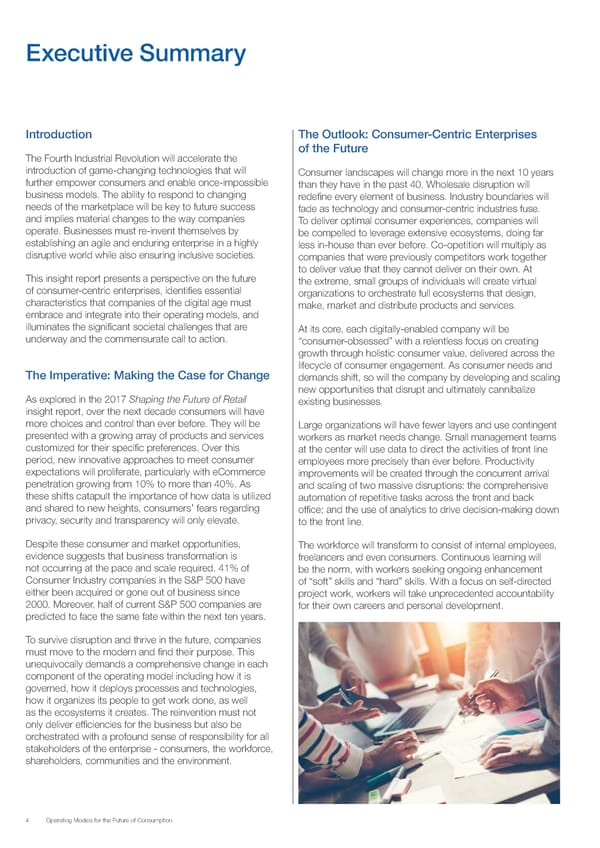Executive Summary Introduction The Outlook: Consumer-Centric Enterprises of the Future The Fourth Industrial Revolution will accelerate the introduction of game-changing technologies that will Consumer landscapes will change more in the next 10 years further empower consumers and enable once-impossible than they have in the past 40. Wholesale disruption will business models. The ability to respond to changing redefine every element of business. Industry boundaries will needs of the marketplace will be key to future success fade as technology and consumer-centric industries fuse. and implies material changes to the way companies To deliver optimal consumer experiences, companies will operate. Businesses must re-invent themselves by be compelled to leverage extensive ecosystems, doing far establishing an agile and enduring enterprise in a highly less in-house than ever before. Co-opetition will multiply as disruptive world while also ensuring inclusive societies. companies that were previously competitors work together to deliver value that they cannot deliver on their own. At This insight report presents a perspective on the future the extreme, small groups of individuals will create virtual of consumer-centric enterprises, identifies essential organizations to orchestrate full ecosystems that design, characteristics that companies of the digital age must make, market and distribute products and services. embrace and integrate into their operating models, and illuminates the significant societal challenges that are At its core, each digitally-enabled company will be underway and the commensurate call to action. “consumer-obsessed” with a relentless focus on creating growth through holistic consumer value, delivered across the lifecycle of consumer engagement. As consumer needs and The Imperative: Making the Case for Change demands shift, so will the company by developing and scaling new opportunities that disrupt and ultimately cannibalize As explored in the 2017 Shaping the Future of Retail existing businesses. insight report, over the next decade consumers will have more choices and control than ever before. They will be Large organizations will have fewer layers and use contingent presented with a growing array of products and services workers as market needs change. Small management teams customized for their specific preferences. Over this at the center will use data to direct the activities of front line period, new innovative approaches to meet consumer employees more precisely than ever before. Productivity expectations will proliferate, particularly with eCommerce improvements will be created through the concurrent arrival penetration growing from 10% to more than 40%. As and scaling of two massive disruptions: the comprehensive these shifts catapult the importance of how data is utilized automation of repetitive tasks across the front and back and shared to new heights, consumers’ fears regarding office; and the use of analytics to drive decision-making down privacy, security and transparency will only elevate. to the front line. Despite these consumer and market opportunities, The workforce will transform to consist of internal employees, evidence suggests that business transformation is freelancers and even consumers. Continuous learning will not occurring at the pace and scale required. 41% of be the norm, with workers seeking ongoing enhancement Consumer Industry companies in the S&P 500 have of “soft” skills and “hard” skills. With a focus on self-directed either been acquired or gone out of business since project work, workers will take unprecedented accountability 2000. Moreover, half of current S&P 500 companies are for their own careers and personal development. predicted to face the same fate within the next ten years. To survive disruption and thrive in the future, companies must move to the modern and find their purpose. This unequivocally demands a comprehensive change in each component of the operating model including how it is governed, how it deploys processes and technologies, how it organizes its people to get work done, as well as the ecosystems it creates. The reinvention must not only deliver efficiencies for the business but also be orchestrated with a profound sense of responsibility for all stakeholders of the enterprise - consumers, the workforce, shareholders, communities and the environment. 4 Operating Models for the Future of Consumption
 Operating Models for the Future of Consumption Page 3 Page 5
Operating Models for the Future of Consumption Page 3 Page 5